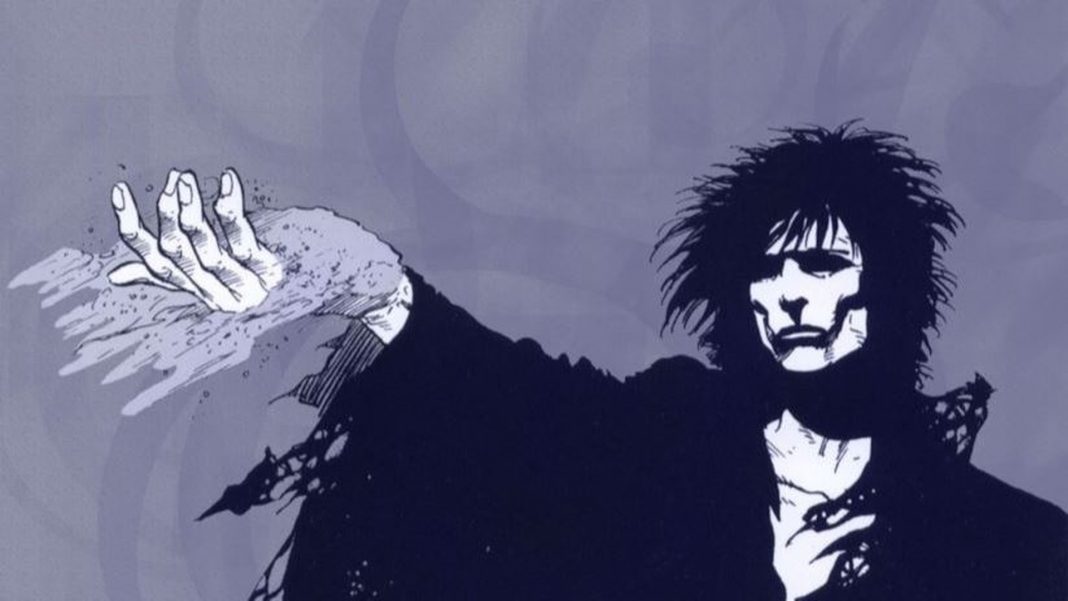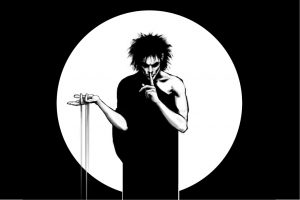With a plethora of characters to cast, it wasn’t easy to find all the voices for Audible’s new series The Sandman. We spoke with author Neil Gaiman and director Dirk Maggs about the challenges and advantages in casting The Sandman. We also spoke with actor James McAvoy on his take on playing the titular character.
For the Sandman himself, Morpheus, the casting was less the issue compared to the actual recording. Recording for Morpheus was originally scheduled at an earlier time, however, McAvoy’s time on stage in Cyrano de Bergerac in the West End meant that he needed time to recover until after the play’s run was through. When it came time to record, the lockdown was announced, and so McAvoy had to turn his spare bedroom into a recording studio.
“The good thing about that was that by the time I got to record in my spare room where I built a makeshift recording studio, the rest of the cast was already laid down there performances,” McAvoy explained. “Every single cast member has done their job except me. So I got to be in the position that I’ve never been before in my entire career where I got to listen to the entire show before I recorded my work. And it was awesome. It was absolutely fantastic. It was so good.”
JAMES MCAVOY’S VOICE IN 'THE SANDMAN.' That’s it. That’s the tweet. pic.twitter.com/JcZa9BF1N8
— Audible (@audible_com) July 16, 2020
For McAvoy, tackling a stoic character like Morpheus was about finding the humanity in a being that is so far from being human. Although McAvoy describes him as a character who doesn’t understand the human experience, at the same time, Morpheus is tied to it. “[He] serves the human experience, he’s very connected, he’s a part of the human experience.[He] provides a vital need for humanity.”
Morpheus is first introduced to the audience as a captive of Roderick Burgess, he has been trapped by the magician for 72 years. “I think what I really try to tap into was the fact that he’s been tortured for such a long time at the beginning of the story,” McAvoy said. “He’s been stripped naked, all his power and all his strength, and all the things that make him feel valid, you know, they’ve all been taken away from him for decades.”
He continued, “[He’s] not human, but he is something slightly broken. And he is somebody who’s unsure of himself again, coming out of this thing. And those are all things that I think we can relate to as human beings. Those are those experiences, emotions and context that we can identify with.” Exploring this growth in Morpheus’ character was McAvoy’s touchpoint and the emotional depth that he adds in his lines speak volumes to the Sandman’s suffering over the years.
In tackling the creation of Morpheus’ unique voice, it was a joint effort. McAvoy remembers Gaiman referring to Morpheus’ voice as classical, “We wanted it to sound almost like he was speaking Shakespeare’s verse,” McAvoy added. Adding poetry to Morpheus’ lines allowed the character to walk the line between being regal and being a Dream Lord, but also being a character that you could follow throughout the many journeys of the season. “He’s got to be relatable in some ways and that’s a tricky and fine line to walk.”
For Magg’s part, he admired the path that McAvoy took to finding his version of Morpheus, “James is like a ball of energy. He’s totally committed to finding his way into the character.” While it was a challenge to figure out how to evoke such a passive character, the directorial decisions breathed a new life into an old character. “I need an actor who’s already giving energy just by in the room, and that’s James,” Maggs continued. “And, of course, James can do the voices. We discussed should he be a Scottish Morpheus, should he be an English Morpheus, should he be an American Morpheus? And in the end, we went for a sort of classical British actor kind of feel to it because that was [what] Neil originally heard it in his head.”
The unique aspect of Audible’s version of The Sandman is that it combines dialogue and narration spoken by each character. While Gaiman acts as the main narrator, oftentimes Morpheus narrates his own thoughts and his own feelings.
“It was kind of cool. “What was really nice is sometimes Neil is narrating it, and then sometimes I’m narrating it. It was kind of a thrill for me as a fan to get to share that duty with Neil himself,” McAvoy confessed. “And it’s quite nice handing that back and forth between the two of us. I like it’s not just about acting, it was also about storytelling. And, and that’s really how he sees those dreams as well.”
He continued, “I think those moments where he narrates, he’s somehow trying to reclaim his journey, his experience again after being so tortured and abused. [They] were moments for him, to be aware of what he’s going through and relay that to the listener and to humanity, in general, whose dreams he’s traveling through. And sort of the enjoyment of that as well, like owning it.”
While there were some struggles, like finding enough American actors to voice all the serial killers, some actors were more than happy to take up a role in the series. “Michael Sheen was pretty much on the doorstep asking to be let in,” Maggs joked. “And we weren’t going to turn him down either.”
Oh fractious day! ‘Sandman’ on Audible is out today! @audibleuk @DCComics pic.twitter.com/ANxrhUlpP1
— michael sheen (@michaelsheen) July 15, 2020
“Michael [Sheen] is a huge Sandman fan,” Gaiman confirmed. “Michael loves Sandman. Michael has loved Sandman since he was at Drama school in 1988. He picked up on Sandman early and it was one of the things that he loved. So I knew that I couldn’t leave him out. I also wanted something that would be perfect for his talents.”
Gaiman based the appearance of Lucifer off of a young David Bowie, describing the look as “a junkie angel, just incredibly beautiful, but off.” So, when it came time for Sheen to voice the character, Gaiman said, “‘Oh, I wonder if we could get Michael Sheen to do it as David Bowie.’ And that one was very easy.” He continued, “Michael and I were working together on post-Good Omens stuff and I said, ‘How would you like to be David Bowie as Lucifer in Sandman?’ And he said, ‘Just try and stop me.’ So, he came up and did it.”
Describing Sheen’s performance, Gaiman said, “He is opening his mouth, and David Bowie’s voices coming out. But it’s not David Bowie. [I]t’s not like an impressionist David Bowie. He’s just playing it as if it was David Bowie playing Lucifer rather than Michael. And that was the most surreal moment of the whole audio recording.”
For Maggs, the actors played a pivotal role in adapting their characters. He praised the actors for helping him find layers of subtlety in the original series, saying, “One of the great things about working with actors is that they find stuff in a script that not even the author knew was there. And that’s just magic. This is why they pay big bucks to actors like James, and Taron [Egerton], and Kat [Dennings], and all of that. They’re not paying them just for their beauty, or their voices, they’re paying them for their brains. These guys come in with an intelligent approach and they find stuff. They dig, they mine the lines.”
He articulated, “And it sounds like the most pretentious bullshit, but it really isn’t. They absolutely can find stuff you didn’t know was there, Neil didn’t know was there. And there were times when James or Taron or Shey [Greyson] who’s playing Rose, just found an angle on the character that we weren’t expecting that brings all that stuff out. I would have been too insecure to let that happen 28 years ago, now, I welcome it. Now I don’t go in with preconceptions on it.”
And although Maggs will admit that the adaptation won’t be perfect for everyone, he assures that, “[In] the end, the cast of that caliber is going to give you something which should be in the ballpark. Let’s put it that way.”
The Sandman is available now on Audible.








